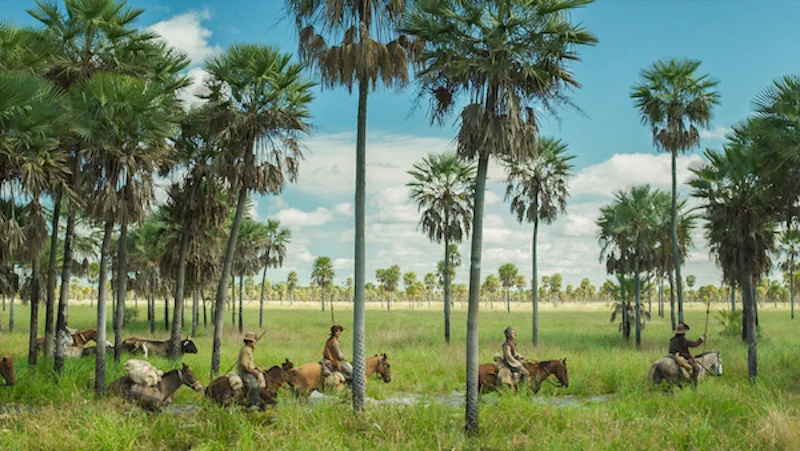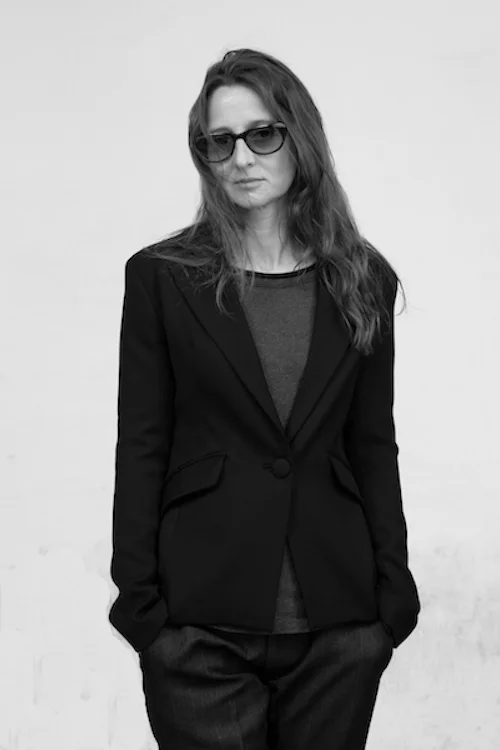While I interview Argentinian filmmaker Lucrecia Martel in Venice I can’t help but feel incredibly vulnerable. For one, I started writing about cinema and attending film festivals after her previous film ‘The Headless Woman’ was presented at the Cannes Film Festival in 2008. And I never had a chance to watch either ‘The Holy Girl’ or ‘La Ciénaga’ before that. So I’m a Martel virgin going into her latest ‘Zama’.
But mostly, I feel unguarded, bare in the presence of this quietly powerful woman. She is a filmmaker, an artist, an undeniable trendsetter — Martel smokes a cigar during our interview and of course, there are those trademark cool glasses she wears — but she is first and foremost a formidable woman. I gush constantly and I’ll admit hearing myself on tape to transcribe our interview afterwards is painful.
At this year’s Venice Film Festival, Martel unfurled the existentialist epic ‘Zama’, her first feature in about a decade, a time during which Martel tried to get a science fiction film made and nursed herself back from a debilitating illness — among so much more, I imagine. ‘Zama’ is her screen adaptation of Argentinian writer Antonio Di Benedetto’s classic 1956 novel about a Spanish crown officer waiting in limbo for an official transfer out of his own personal tropical purgatory. I agree with the Variety review that called the setting a “colonial dystopia” wholeheartedly, and to then one up that description, if there ever was a perfect cinematic interpretation of a quiet hell on earth in a film, especially in our modern society where we crave constant stimuli, then Martel’s oeuvre comes first on that list.
When I wrote my initial thoughts on the film in Venice, I was told by a colleague that my writing betrayed my confusion about Martel’s work. I’ll admit it here, I’m still working through the nooks and crannies of ‘Zama’. But that’s Martel’s genius, she stays with her audience and never lets go of our thoughts. You either buy the whole package of her extraordinary filmmaking wholeheartedly, or you walk out puzzled by her vision — there is no middle ground. During our interview, she proves just how insightful she is and that’s another reason why I am left such a half-blubbering fool in her presence.
Throughout our leisurely talk, Martel finishes my sentences, kindly. Even more kindly, she answers my questions, even those that I’m thinking up so perfectly in my mind but end up formulating so badly — so much so that her translator is sometimes left baffled by me. Yet this turns out to be one of the best interviews I’ve ever been a part of, thanks to Lucrecia Martel’s wonderful genius, her ability to explain the inexplicable in a few simple, yet powerful words.
Just like her films do.
'Zama' opens theatrically in New York on April 13 at the Film Society of Lincoln Center and the IFC Center, and in Los Angeles on April 27 at the Laemmle Royal Theater.
Photo courtesy of La Biennale di Venezia
Lets start from your beginnings in Salta, Argentina. I read that your first intensions were to go into science, and then you ventured into filmmaking. You are self taught because of the way the schooling was in Salta, the lack of funds for education in your town. So what do you think the advantages of being self taught in filmmaking are and what are its disadvantages?
Lucrecia Martel: First of all, lets put it in a general context. I belong to that sector of the population that is women. Women usually are self disciplined, and self educated. Being a woman, white and belonging to the middle class in Latin America doesn’t put you in a very fragile or vulnerable position but to be a woman, yes maybe. A poor Black woman will actually be in a worse position than myself. But as to the origins you were talking about, being a woman I see as a great advantage because in a way you get trained for failure which in my profession — in cinema — is very important.
I feel bad for male friends and colleagues, but a man’s education is made, in a way, in order to avoid failure. That’s why I think gender violence is more men on women rather than women on men, because they are not able to manage frustration. This ability to manage frustration is a big advantage in this profession and I am actually very surprised that there are not more women making cinema today. Because being a woman makes you more ready to do this.
Do women then make better filmmakers?
Martel: Sometimes yes, sometimes no. Kathryn Bigelow is an excellent example of a woman seeing things like a man. She’s a super talented woman and director but she has such a white, male, American vision of things.
I’m not saying that all female moviemakers are better than men but I think that if you are born on the margins, on the frontier of power you have a chance of seeing things better rather than if you are inside the mainstream, in power. But only if you are self aware of what is going on and if you know how to use it.
When did you know you needed to bring this novel by Antonio di Benedetto to the big screen?
Martel: I read the novel once I finished writing a script for a film that I could never shoot because I didn’t have the rights for it. But I spent one year and a half working on that script without getting any money and in the end, without making the film. For me, the process of preparation for a film is like entering a world that you do not know — something unknown. In the end, it’s very difficult to get out of that world if you haven’t made the film. So I had to find a way to get out of all the process and decided to go on a trip, a very dangerous one, I was driving this boat and in those conditions I read ‘Zama’. And ‘Zama’ is the story of a man who is trapped, waiting for something, for a kind of prize for what he has done, and in a way it was similar to my position. I was waiting for something which could make up for what I’d done. So the similarities of our positions made it similar for me to feel it with such a huge and deep strength.
I’ve checked out a lot of the reviews on ‘Zama’ and even of your past films. I see that many of the critics read a lot of symbolism into your films. How do you feel about people reading so many symbols into your films?
Martel: I believe that this idea of decoding things is kind of a human sport, a game that people like to play. The origin is maybe in the need for people to create or elaborate or expand on what other people do. Which is fine but I think there is a lack of intellectual effort on the side of those who do that. As to the symbols that people see or can be found in my films I think it’s rather due to a kind of condensation of meanings rather than using symbols to replace something else.
You amazed me with your multidimensional depiction of the servants in the film. They don’t behave as we are used to seeing in period films. How did you work out those dynamics?
Martel: I don’t know if this is what you are asking me but it was really my intention in ‘Zama’ not to put too much submission in the servants’ behavior. I don’t know how it was at the time but I don’t think that people can be subdued in such a powerful way. I think that sometimes we like to think that servants they didn’t even look at the face or in the eyes of their masters and I’m sure that they found small ways to take revenge. I think this image of servants has been created by white men to tell a story, a tale of total submission. So on purpose, I wanted to put in my film gestures, very small, they were small details that would reveal this lack of submission, or a reaction to this submission.
This image of power is a kind of a trap, a way to keep the power — for the powerful to stay in power. It’s the same thing that Quentin Tarantino does. He believes that he is criticizing a system but all his films do celebrate violence. He is very talented, and maybe that’s the reason why people do not criticize these things in his films. For example that scene in ‘Pulp Fiction’ where they shoot the black man [Marvin] in the back of the car, I think it’s such a violent scene. And Tarantino believes that by shooting these scenes and making these films he’s criticizing the system but in a way he’s only supporting it. He thinks he’s shrewd, that he’s doing something different but it’s very dangerous because it’s all very conservative — he’s doing the same thing that many horror films are doing.
It’s very difficult to represent violence without endorsing it.
What do you mean?
Martel: I remember one war film, a Russian one by the title of ‘Come and See’, where there is a boy that is covering his ears because he doesn’t want to hear the sounds of the war. And just this image without all the war activities of exploding and shooting conveys the deep violence of war. All American films celebrate violence in a way, because violence and war are the economic basis of their system. Even Mr. Clooney with the best intentions is celebrating violence and war because the intelligence is missing, the way to analyze all this which is at the basis of the system.
In ‘Zama’ there is a beautiful scene in the book in which a prisoner makes a confession and says that one night he dreamt that he had a bat wing growing on his shoulder and he decided to take it off. And so in the morning he wakes up and sees a black woman lying dead in the bed. He has killed her. And he says “I loved her and I killed her.” I think it’s a beautiful scene because it allows you to sympathize with a person who has done something horrible and cannot find a way to recognize the fault of his ways. But in the end I didn’t put it in the film because I didn’t want to show a dead woman, which would have been necessary in that scene, when in Argentina every sixteen hours a woman is killed. I can’t see any poetic reason to show the body of a dead woman in ‘Zama’. I don’t think that is necessary to reflect on things, even if the scene is so beautiful.
I don’t want to see a dead or an injured woman in a scene and I don’t want people to get used to this image.
This piece was originally published on October 2nd, 2017 here.

